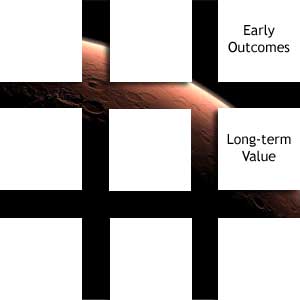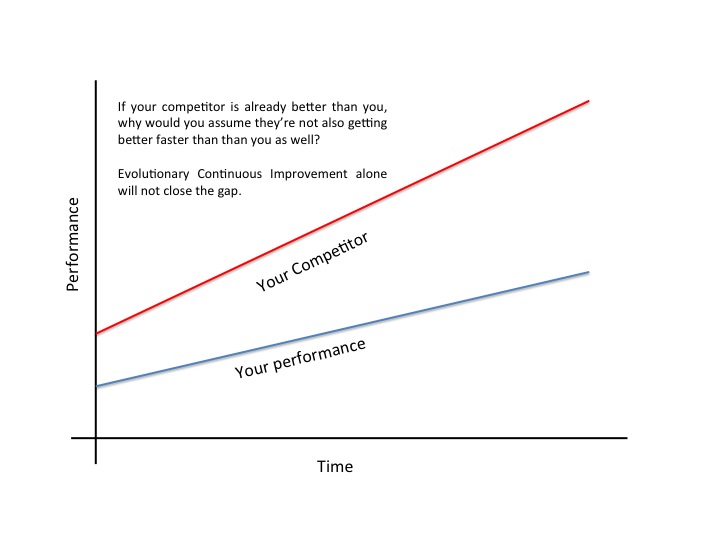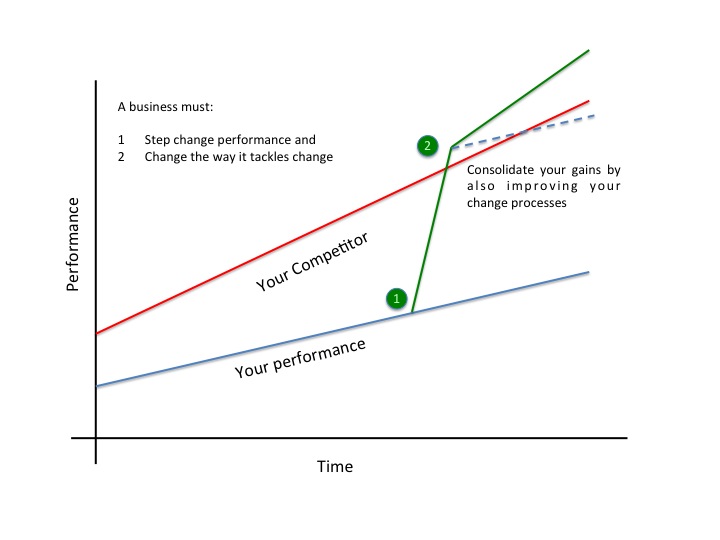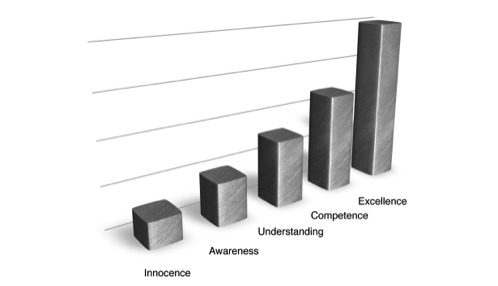The game has changed
Politicians and economists may argue about the technical definition of a recession but the reality is that this is the new business as usual
If you do what you've always done, you'll get what you've always gotten
Anthony Robinns
Even that's not true anymore, in today's economic conditions if you carry on as before you'll fail to meet stakeholder expectations
Delivering change is one of, if not the, key differentiating capability of today's high performing businesses. In a low or no growth economy the ability to drive radical change programs that extract maximum value from customer relationships, the products and service offer and the supply chain is critical to achieving bottom line growth that outstrips the top line performance
Assured
Delivery
Most have a solid line management background in large or medium size enterprises so can bring the credibility of having 'been there and done it'. They also have first rate consulting skills, developed at one of the big firms or with a recognised specialist consultancy.
Many also bring the reassurance of having successfully run their own businesses.
Together, we can create a different tomorrow
Our approach, developed from working with hundreds of industrial companies in over 35 different countries, is underpinned by a thorough and systematic approach to collecting and analysing data. From this knowledge we able to create robust and risk mitigated delivery plans
From the most straight forward opportunity review through to the design and active involvement in delivery of a change plan Northlight Associates can put a team together to meet your specific needs.
Knowledge Snippets

Thank you, your request has been processed
Leadership
Great leadership is the single most important determinant of business success. Without it few businesses can prosper and while it’s not a guarantee that you’ll overcome all the external factors pushing against your business, it is the surest way to give you the best chance. The best thing about it is that it is one of the easiest things to affect, because it’s down to you.
The ten things that mark out a great leader are:
- Consistency
Having a direction and being clear about it is actually much more important than fussing over getting precisely the right direction or to keep changing your mind as you try to find the perfect solution.
- Communications
It's sometimes surprising how many people in leadership positions aren't natural communicators, but whether it comes to you naturally or it's something you have to work at, you MUST do it - frequently; ideally in small groups in regular short bursts. If you don't tell people things the gap will be filled with rumour and speculation. Use clear, simple messages, frequently.
- Customers, customers, customers
No matter how bad it gets, never forget the customer. You can control and cut costs all you like (and that is important) but you need to sell stuff. Delighting customers takes very little incremental additional effort so do it. Never let your standards of customer service slip.
- Fairness
Every small child learns that life isn't fair and the situation you find yourself in may also feel like it's not fair. This doesn't mean your shouldn't be. In troubled times people need to know that they'll be treated fairly, that decisions you make are based on logic and analysis. This doesn't imply weakness. Be tough, as tough as you need to be, just be fair with it.
- Plan, Do, Check, Act
Deming's 'Plan Do Check Act' cycle was never more appropriate than when times are tough. Think things through, do them, check that they've worked and take corrective actions if it hasn't worked as planned or cement it in place if it has. Find out more about PDCA in the Operations Resources section.
- Concern for Impact
It's not about what you think, what you say and what you do - it's about what people hear, see and understand. It's essential that you know if the message is getting across to the audiences that need to hear it. If they don't understand then you have to do something different.
- Flexibility
Just as the Plan Do Check Act cycle implies, not everything works out the way you intended and anyway the external world is continually changing. The most important thing is to remain focussed on the objective - if the plan's not getting you there, change the plan.
- Learning not blaming
While it's true in any environment, that every situation provides an opportunity to learn something, this is especially true in difficult times. It's likely to be a set of circumstances that most if not all of your managers are unfamiliar with. Don't be tempted to blame people if they get things wrong; learn, move on and focus on acting as a team.
- Delegation
You can't do it all yourself. No really, you can't. Break tasks in to manageable pieces and then allocate them fairly amongst the team. When times are tough this will almost certainly require asking people to step out of their comfort zone and to complete tasks outside their functional area. This mains you need to check on action regularly and communicate often.
- Listening
Even if you've been through this cycle many times before you don't have a monopoly on all the good ideas. Listen. Listen to your management team, your employees and your customers and don't be afraid to take external advice. You still have to make the decisions; by listening to others and adopting new ideas where appropriate you increase the chances that your decisions will be good ones.
The Continuous Improvement Fallacy
When I grew up kids were encouraged to play a musical instrument and play a sport out side of school – not just for the educational, spiritual and health values but because it would look good on their CV. Today almost every kid does these things so it creates no differentiation at all; the only reality is that now if you don’t do these things you're definitely 'out'. To get ‘in’ you have to find something else remarkable to differentiate you.
Business is the same. Organisations, the world over, have spent millions on Continuous Improvement programs believing that they offered a winning strategy. While this money has not been completely wasted it will not have created the differentiation many of the business cases for the investment will have claimed.
If your competitors are already better than you, then why can you assume anything other than that they are improving faster than you as well? Most conventional Continuous Improvement programs are based on incremental evolutionary change and will only help to slow the rate at which the competitors are pulling in front of you.
The real danger in such programs is that they can take huge energy to keep going and at the same time create a sense of complacency in management, who feel that they're doing enough.
The real danger in such programs is that they can take huge energy to keep going and at the same time create a sense of complacency in management, who feel that they're doing enough.
An organisation needs to drive twin ‘turbo chargers’ to accelerate their performance. They need to seek mechanisms to drive step change; not to create the best imaginable performance but just to jump ahead of the competition. There is always the possibility of driving a game changing step, though this is not always possible and the subject an article all of its own.
The second challenge is the need to use the initial step change process to change fundamentally how the business undertakes change itself, so that they get better at getting better. This is essential to ensure that all of the effort put into step change is not lost in the decay and malaise that becomes inevitable unless you take management action to stop it.
This performance fall back usually occurs because the initial step is seen as the goal, the end of the journey and something that after achieving the business can rest a while. To ensure that this does not happen there needs to be a focus, right from the start, on what comes after the initial step and actions need to be put in place immediately to begin the process of further improvement.
While this seems daunting it is also a great way of getting involvement levels up.
The second challenge is the need to use the initial step change process to change fundamentally how the business undertakes change itself, so that they get better at getting better. This is essential to ensure that all of the effort put into step change is not lost in the decay and malaise that becomes inevitable unless you take management action to stop it.
This performance fall back usually occurs because the initial step is seen as the goal, the end of the journey and something that after achieving the business can rest a while. To ensure that this does not happen there needs to be a focus, right from the start, on what comes after the initial step and actions need to be put in place immediately to begin the process of further improvement.
While this seems daunting it is also a great way of getting involvement levels up.
Step and then Step Up – don’t just fall back on your original Continuous Improvement processes.
From Innocence to Excellence
In today’s business world everything is changing all of the time. One of the greatest challenges for most management teams is that they must improve everything all of the time.
We’ve found it helpful to break these development journeys into phases, so that businesses can better understand where they are today and describe clearly where they need to get to.
We’ve found it helpful to break these development journeys into phases, so that businesses can better understand where they are today and describe clearly where they need to get to.
We call this the ‘Innocence to Excellence’ journey, consisting of five steps. No business is at one step of the journey in all aspects of what they do; they’ll be good or perhaps even excel in some areas while their capabilities will be far less developed in other areas. What is more, most organisations do not actually need to excel in everything in order to delight their customer and beat their competition.The first is the state of innocence where people are not even aware there is a different or better way of doing things. Most organisations have very few areas in this state, but it is a cautionary point.
The next phase is that of awareness, when people understand the need for change but have either not started to change things or perhaps don’t know how to. Lots of businesses have areas like this.
Progressing further people begin to establish an understanding of what needs to change and perhaps even how it needs to be achieved.
Competence is the next stage, where people have established a new level of performance and this has become the routine rather than a one off. Many organisations spend a fortune on external benchmarking – our advice would be to save this money initially and focus on the challenge of ‘making every day a best ever day’; deliver your best historic departmental performance as a matter of routine. Most organisations get far more from this, more quickly, than they do from an elaborate external benchmarking exercise.
Beyond competence there is excellence. Few organisations can or need to achieve this in everything and to reach this level of truly world-class performance you need a detailed knowledge of what the competition are doing and what the market is seeking. At this point external analysis is essential. Excellence comes at a price, so a business need to understand clearly exactly what is needed. The good news is that the need to take this step comes after a series of performance gains from the earlier steps which will have made the business more confident in its abilities and will almost certainly have delivered a level of profitability where the expense of these final steps is more affordable.
In the tools section of our resources library there is an ‘Innocence to Excellence’ template. Further descriptive versions, which describe achievement in these phases for specific business areas, are available on request.
The next phase is that of awareness, when people understand the need for change but have either not started to change things or perhaps don’t know how to. Lots of businesses have areas like this.
Progressing further people begin to establish an understanding of what needs to change and perhaps even how it needs to be achieved.
Competence is the next stage, where people have established a new level of performance and this has become the routine rather than a one off. Many organisations spend a fortune on external benchmarking – our advice would be to save this money initially and focus on the challenge of ‘making every day a best ever day’; deliver your best historic departmental performance as a matter of routine. Most organisations get far more from this, more quickly, than they do from an elaborate external benchmarking exercise.
Beyond competence there is excellence. Few organisations can or need to achieve this in everything and to reach this level of truly world-class performance you need a detailed knowledge of what the competition are doing and what the market is seeking. At this point external analysis is essential. Excellence comes at a price, so a business need to understand clearly exactly what is needed. The good news is that the need to take this step comes after a series of performance gains from the earlier steps which will have made the business more confident in its abilities and will almost certainly have delivered a level of profitability where the expense of these final steps is more affordable.
In the tools section of our resources library there is an ‘Innocence to Excellence’ template. Further descriptive versions, which describe achievement in these phases for specific business areas, are available on request.



















